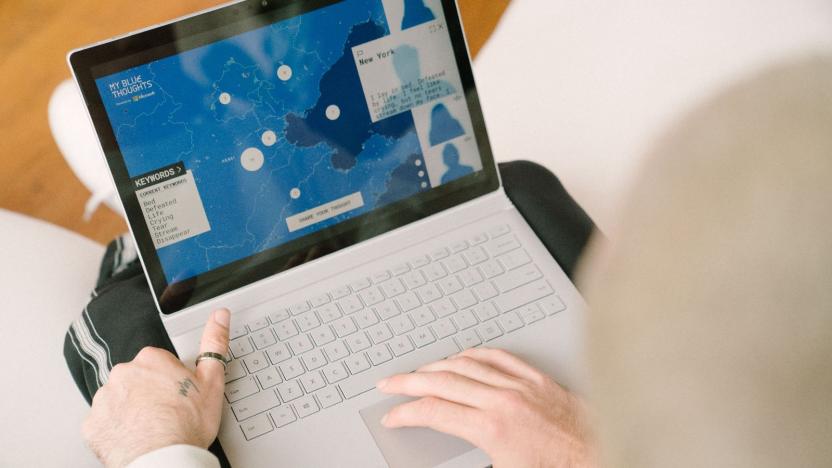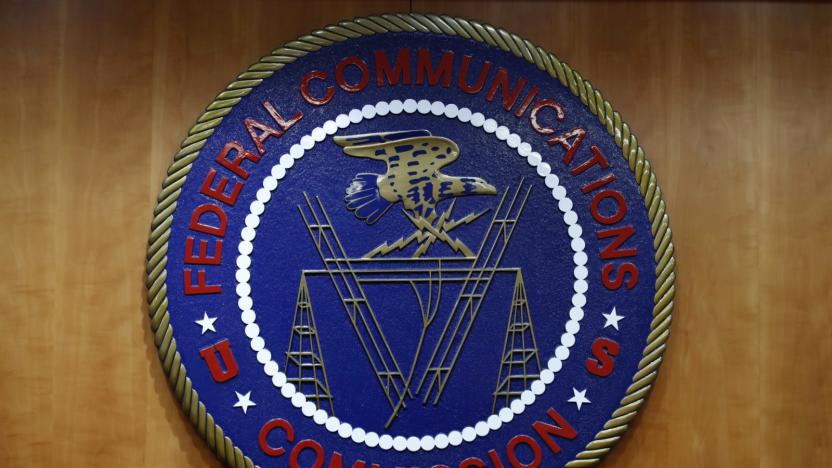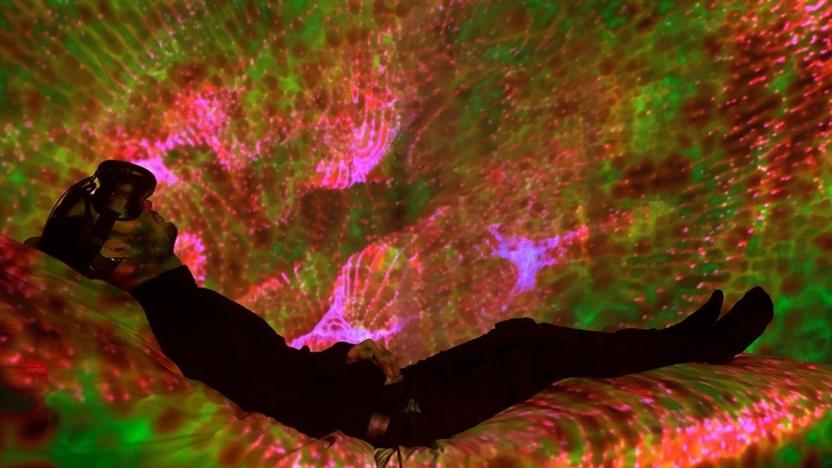Mental health
Latest

HBO will display mental health notices ahead of some shows
The warnings shown before movies or TV episodes typically focus on violence or other graphic material which viewers might find upsetting. However, these warnings don't always address more complex issues like mental health. HBO wants to change this by displaying "bumpers" before episodes which portray characters experiencing mental health issues, giving viewers information about accessing available support services.

Facebook and Messenger’s new camera filter, stickers focus on mental health
In honor of World Mental Health Day, Facebook has launched a couple of features that it hopes will bring awareness to the cause and help people who may need emotional support. For starters, it worked with the World Health Organization (WHO) to create a camera filter for Facebook and Messenger Stories called "Let's Talk," which the company says is designed to be an invitation for friends or family to reach out for support if they're struggling. According to Facebook, based on a survey it conducted in the US, UK and Australia, 80 percent of people who participated said they could be more honest when using messaging apps, rather than speaking to someone in person -- hence why it thinks these features could be helpful.

Microsoft and Lauv launch website focused on mental health
At first glance, the glowing blue booths at musician Lauv's concert could be mistaken for avant garde refrigerators. But the vending machine-sized capsules are actually part of a collaboration between Microsoft and singer-songwriter Lauv called My Blue Thoughts. Two of these booths were set up at the artist's recent October 5th concert in Washington DC, accompanied by two tablets and a sign.

BBC's smart keyboard helps kids live healthy digital lives
The BBC wants to help kids have healthy and positive interactions online, and it's hoping its new Own It app will do just that. The app is centered around a keyboard that pops up whenever a user begins to type. If the message is negative, the app can offer support, give advice and recommend talking to a trusted adult.

YouTube will stop displaying exact follower counts in September
In an attempt to take the pressure off of creators, YouTube is changing the way it displays how many followers an account has. Throughout September, the platform is rolling out abbreviated public subscriber counts. For example, if a creator has 1,234,567 subscribers, viewers will see that the count as 1.23M. YouTube announced the change in May, but it released more details this week. As you might imagine, users are not happy.

FCC proposes '988' for quick access to national suicide prevention line
The FCC wants accessing a national suicide prevention line to be as simple as dialing 988. In a report sent to Congress today, staff members recommend that the FCC designate 988 as the 3-digit dialing code for a nationwide suicide prevention and mental health crisis hotline.

Brain-controlled VR lightshows could lull you to sleep
By most accounts, technology wreaks havoc on our sleep. Even tools meant to help us sleep better can make insomnia worse. But sleep and tech don't have to be mutually exclusive. Artists and researchers from Royal Melbourne Institute of Technology (RMIT) University have created a virtual reality tool to induce sleep. The device, Inter-Dream, combines ambient music controlled by artists with kaleidoscopic visuals controlled by the user's brainwaves, via EEG.

How NASA keeps its astronauts safe and sane in space
Astronauts endure one of the most dangerous, high stakes, high stress professions on (or off) the planet -- a job matched in isolation, confinement and extremity perhaps only by arctic field scientists and ballistic missile submarine crews. Of course, the latter two rarely have to deal with radiation exposure, gravity changes, or the prospect of being sucked out an airlock.

Mental health apps are sharing data without proper disclosure
It's important for health apps to keep your data under lock and key, but it's not clear that's the case for some mental health apps. A study of 36 mental health apps (not named in the public release) has revealed that 29 of them were sharing data for advertising or analytics to Facebook or Google, but many of them weren't disclosing that to users. Only six out of 12 Facebook-linked apps told users what was happening, while 12 out of 28 Google-linked apps did the same. Out of the entire bunch, just 25 apps had policies detailing how they used data in any form, while 16 described secondary uses.

Apple signs Prince Harry and Oprah for new mental health docu-series
Celebrity royalty is commonplace on streaming services, but Apple+ has just gone and snagged an actual royal. It's teaming Prince Harry (aka the Duke of Sussex) with Oprah Winfrey on a new mental health docu-series. The Prince, who's also exec-producing alongside Winfrey, announced the news on Instagram. It arrives on Apple+ in 2020, before which we should get more information, including a title.

Log anxiety attacks, take control of them with Worry Watch
Worry Watch is an app that acts as a journal for tracking moments of worry, anxiety or panic. You log moments throughout your day when you're feeling anxious or nervous and what the outcome eventually was. Overtime, the app shows you a break-down of all your moments of anxiety to help you better understand and perhaps cope with these issues as well as whether they were even worth worrying about or not. It's available for iPhone and iPad for US$1.99. As someone who suffers with anxiety, I was eager to test this app out to see its features and if it overall really works by helping me to see what I struggle with at a glance. Worry Watch's home screen is blank until you hit that Plus icon on the top right to add a new event. Here you type in a title, choose a date and optionally add a reminder and notes. That's where the similarities to a regular calendar or journaling app end. There's two additional fields in Worry Watch for Context and the outcome of the situation, which become very important to the app and hopefully down the line, your health. If you tap "Context," you have six categories to choose from: Career, Family, Finance, Health, Other and Social. You choose based on which aspect of life is affecting this particular moment of anxiety. The app allows for complete customization of these as well in the Settings. I decided to change the "Other" context to "Unknown" for the occasional bursts of anxiety or panic some people may experience that seem to have absolutely no reason or purpose. Along the bottom are three additional views: Filter, Data and Settings. The filter displays your entire list of logged anxieties on the home page the way you want them organized: by outcome, context, date or day. The Data page provides charts for outcome, context or date to help you determine how often your anxiety might not have been necessary based on outcome or perhaps in what contexts you seem to develop fear the most. Self-awareness is key to overcoming anxiety. I've only been using Worry Watch for a short period of time and I can already tell from experience that down the line it's going to be extremely useful. I logged a few issues over the past few days and seeing the outcome pie chart essentially inform me that my worries were all unwarranted is gratifying. Tools like these are essential for controlling yourself in the future and not letting anxiety get the best of you. Settings features the ability to set a passcode and restrict access to your journal, customize contexts as previously mentioned, set the default outcome and a few other options to suit your tastes. I highly recommend that anyone with an anxiety disorder, panic disorder or even just those who find themselves worrying more often than they should give Worry Watch a go. The benefits it brings for self-awareness and a better understanding of your issues are immensely useful and reassuring. Get Worry Watch in the App Store for $1.99.

Neverending Nightmares is horrific, repulsive and true
Caution: Some of the following content contains graphic descriptions of violent thoughts that Gilgenbach has experienced in real life. Those sensitive to such information should read with caution, and contact their nearest mental health care facilities if needed. In the US, the national suicide prevention hotline is 1-800-273-8255. Neverending Nightmares is a "Trojan horse of sorts," independent developer Matt Gilgenbach told Joystiq at PAX Prime. At first glance, the game appears to be a stylized horror game full of genre tropes: creepy little girls, old dolls with dead eyes, haunting visions of gore and violence. However, the truth is that Neverending Nightmares is actually an intensely personal exploration of Gilgenbach's own thoughts, intended to communicate the awful feelings someone with depression might experience. It has the potential to be a tool for empathy as much as it might elicit late-night scares.

US researching implants that'll help your body and mind heal itself
America's mad science division is at it again, this time imagining a future where your body won't need (as much) medicine to stay healthy, simply by using the resources it already has. Put simply, a person's peripheral nervous system runs the internal organs and summons the troops to fight off infections and repair injuries. DARPA's just received $78.9 million of funding to look into harnessing this system to develop a miniscule implant that'd not only make people healthier and less prone to disease, but could also be used to treat mental health complaints like post traumatic stress disorder in the future.

Therapists are turning to the web to help revolutionize mental health treatments
We all know how effective the talking cure can be, but for many people, carving the time out of their schedule to meet a psychotherapist can be impossible, not to mention daunting. Services like Pretty Padded Room have sprung up to provide a solution to these problems, offering secure video chats with mental health professionals as an on-demand service. In a report by NPR, a 24-year-old entrepreneur reveals that, rather than the confrontational setting we imagine, a spot of online therapy is more akin to "Skyping with a friend."

Asylum Jam aims to instill horror without mental health stereotypes
Asylum Jam, a 48-hour game jam scheduled for October 11, will focus on developing horrifying experiences without contributing to the stigma surrounding mental health issues. Participants are to avoid the implementation of asylums, psych wards, medical professionals and insane patients in their submissions. Concerning the jam's importance, its site references the World Health Organization's report that one in four people worldwide "will be affected by mental or neurological disorders at some point in their lives." The involved press release states that Asylum Jam is intended to show "that you can still create a great horror experience without using inaccurate stereotypes." Asylum Jam's website notes Slender: The Eight Pages, Among the Sleep, One Late Night and SCP Containment Breach as positive examples of modern horror. Asylum Jam will use Brett Chalupa's BMO engine and those interested in participating should check back the jam's website for sign-up links "closer to the event."

Axio's EEG headband helps you teach your brain to focus (hands-on)
Usually when an EEG sensor headset graces these pages, it's used to peer into your thoughts or grant the wearer the power to control other gadgets with his or her mind. While such uses have appeal, start-up company Axio has a new EEG headband that aims to help you learn to better control your own brain. It tracks your level of mental focus in real-time and provides positive reinforcement audio feedback when you're mentally locked in. The neoprene band packs a trio of electrodes, a PCB with a Bluetooth radio and audio out, and a battery pack to power everything. It works by identifying the brainwave readings that correlate to ideal executive function in your pre-frontal cortex and shooting that data to your computer or phone via Bluetooth. Axio's software then shows an onscreen graph that charts your focus level in real-time, and for folks who prefer a more literal tracking method, there's a photo above the chart that moves in and out of focus along with your mind. Additionally, the headband provides pleasing audio neurofeedback when you're focused in order to train you to stay mentally engaged.%Gallery-158654% Unfortunately, we couldn't get much more information about the neurofeedback functionality, as the technology behind it is the company's secret sauce, and it won't divulge more until it's got the cash to bring the band to market. We also weren't able to actually test the band to see how it works, as it's still in the prototype phase and there's still a kink or two left to work out. Axio did tell us that the prototype we got our mitts on was the result of just six short months of work, and that after hacking together the original design using Arduino, the current iteration has a custom PCB better suited to Axio's needs. Co-founder Arye Barnehama also informed us that the band should be on sale by the end of summer, though he wouldn't say for how much or where we'll be able to pick one up. Sometime after it hits store shelves, Axio plans to release an SDK so that enterprising devs can make their own focus-aiding software and implement whatever audio feedback they prefer to help them take care of business -- a dose of Bachman-Turner Overdrive ought to do the trick.

Aussie blogger brings Movember mental health series to WoW blog
From Hollywood celebrities to the guy next door, millions of people have made World of Warcraft a part of their lives. How do you play WoW? We're giving each approach its own 15 Minutes of Fame. Pitched battle in a frantic Battleground feels a little like Armageddon if you're on the wrong side of the wave. Depression can feel the same way to those struggling in its iron coils. Winding together entertaining and informative posts about both is popular blogger Gnomeaggedon, whose WoW blog (which has been tackling PvP topics since the summer of 2008) is working through a special month-long series on depression and mental health for the mustachioed Movember men's health movement. You wouldn't think someone who's struggled with depression himself and mental health issues in his immediate family would be a big fan of the emotional highs and lows of Battlegrounds. It's one of the questions Gnomeaggedon toys with regularly: "Kind of related to your interview with Lady Erinia -- is depression caused by excessive video gaming, or is video gaming 'self-medication' for depression? I know in my case, my depression began when I was a child. I had no idea, and things like that weren't discussed in my family -- so treatment came 20 years 'late.' And where WoW was an escape from the difficulties of life (as alcohol, etc., had been in the past), most people assumed I had a (stereotypical) problem with gaming." With a backlog of years' worth of posts about being a gnome mage, the PvP lifestyle, and scattered plugs for the awareness of mental health issues, Gnomeaggedon has left an indelible imprint in the WoW blogosphere. We had a cozy email conversation with the Aussie player to explore his enthusiastic support for Movember, how many fellow WoW players -- people you play with every day -- are likely to be touched in some way by mental health issues, and how "cleansing the debuff" of mental illness can make such a difference in people's lives.

Schizophrenic computer may help us understand similarly afflicted humans
Although we usually prefer our computers to be perfect, logical, and psychologically fit, sometimes there's more to be learned from a schizophrenic one. A University of Texas experiment has doomed a computer with dementia praecox, saddling the silicon soul with symptoms that normally only afflict humans. By telling the machine's neural network to treat everything it learned as extremely important, the team hopes to aid clinical research in understanding the schizophrenic brain -- following a popular theory that suggests afflicted patients lose the ability to forget or ignore frivolous information, causing them to make illogical connections and paranoid jumps in reason. Sure enough, the machine lost it, and started spinning wild, delusional stories, eventually claiming responsibility for a terrorist attack. Yikes. We aren't hastening the robot apocalypse if we're programming machines to go mad intentionally, right?

New UK Internet Addiction clinic offers in-patient therapy to 'screenagers'
Internet addiction, as you know, is a growing worldwide concern. Recently, the UK opened its first rehab clinic for Internet Addiction (the provocatively named Broadway Lounge), but that was only the beginning. Capio Nightingale Hospital in London has announced its own plan to get gets out of the World of Warcraft and into the real world through an intensive in-patient, day care, or group therapy environment. The program is aimed at 15 to 17-year-olds, although kids as young as 12 could participate. A hospital spokesman said that the service hopes to "address the underlying causes of this addiction to transform screenagers back into teenagers." And if you thought we were running this because we wanted to use the word "screenagers," you might be on to something.

Boozing 27 year-old chokes mom over WoW
This is a sordid story, no matter how you slice it. In short, an adult male violently attacked his family when he was asked to stop his loud drinking and WoW gaming session so the children in the same room with him could sleep. Because of the violent nature of the events, I am putting the details after the break.













